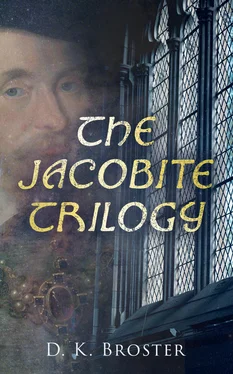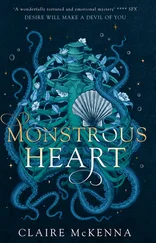“Drap a hint,” he said meditatively, rubbing his chin. “Aye, maybe. Thank ye for the notion, Major; I’ll e’en think it ower. I could aiblins drap a hint mysel’.” And they rode on in silence for a few minutes after that, Keith not knowing whether he more detested himself or the man beside him.
But by the time that they came in sight of the little river Tarff, which they must ford before they could get up to the Corryarrick road, Major Guthrie was busy weaving what he evidently considered a highly diverting explanation of his companion’s interest in ‘yon rebel’, which he now refused to attribute to the alleged ‘obligation’ under which Major Windham professed to labour. “I see it a’,” he chuckled; “he had a bonny sister, and she was kind tae ye, Major—kind as yon ither lass of a Cameron was kind to the Pretender’s son. Or a wife maybe? Oot wi’ it, ye sly dog——” And for a moment or two he gave rein to a fancy so coarse that Keith, no Puritan himself, yet innately fastidious, longed to shut his mouth.
“And that’s how ye repaid his hospitality, Major,” finished the humorist as they splashed through the Tarff. “ ’Tis a guilty conscience, not gratitude, garred ye save him!”
After that he reverted to the subject of his companion’s staff appointment, which seemed to possess a sort of fascination for him, and tapped a very galling and indeed insulting vein of pleasantry in regard to it. And Keith, who would not have endured a quarter of this insolence from anyone else in the world, no, not from the Duke of Cumberland himself, swallowed it because he knew that Ewen Cameron’s life hung on this man’s pleasure. First of all his companion supposed that General Hawley did not know what a viper he was cherishing in his bosom, in the shape of an officer who possessed a weakness for rebels which could certainly not be attributed to that commander himself; of this Keith took no notice, so Major Guthrie passed on to affect to find something mightily amusing in the distinction of staff rank having been bestowed on a man who had run away at the first shot of the campaign. He actually used the expression, but at once safeguarded himself by adding, with a laugh, “Nae offence, my dear Major! I ken weel the twa companies o’ Sinclair’s just spat and gied ower, and you and Scott could dae nae less but gang wi’ them—’twas yer duty.” But after a moment he added with a chuckle, “Forbye ye rinned farther than the rest, I’ve heard!”
Ardroy or no Ardroy, this was too much. Keith reined up. Yet, since it seemed deliberate provocation, he kept surprisingly cool. “Major Guthrie, I’d have you know I do not take such insinuations from any man alive! If you know so much about me, you must know also that Captain Scott sent me back to fetch reinforcements from Fort Augustus.”
Guthrie, pulling up too, smote himself upon the thigh. “Aye, I micht ha’ kent it! Forgie me, Major Windham—yon was a pleasantry. I aye likit ma joke!”
“Allow me to say, then, that I do not share your taste,” riposted Keith, with a brow like thunder. “If we were not both on active service at the moment——”
“Ye’d gar me draw, eh? Dinna be that hot, man! ’Twas an ill joke, I confess, and I ask yer pardon for it,” said Guthrie with complete good-humour. “See, yonder’s the camp, and ye’re gaun tae sup wi’ me.”
Keith wished with all his heart that he were not. But he felt, rightly or wrongly, that he must preserve a certain measure of amenity in his relations with the arbiter of Ardroy’s fate, and, though it seemed to him that he had never done anything more repugnant (except make his recent speech about the possibility of Ewen’s dropping a hint) he affected a demeanour modelled in some remote degree upon his companion’s, and insincerely declared that he was foolish not to see that Major Guthrie was joking, and that he bore him no ill-will for his jest.
What baffled him was the reason for the ill-will which he could hardly doubt that Guthrie bore him. Was it because he had hindered the shooting of a rebel? But, according to his own showing, Major Guthrie hoped to find the rebel more useful alive than dead.
It was certainly no deprivation to the Englishman when he discovered, on arriving at Guthrie’s camp athwart the road, some miles from the top of the pass, that he was not to share the commanding officer’s tent. Finding, as he now did, that the distance from the mountain-side where he had come upon the soldiers was not so great as he had feared, he would much have preferred to push on over the pass to Meallgarva, but his horse and his orderly’s were too obviously in need of rest for this to be prudent, and when he was offered a vacant bed in another tent (for it appeared that the captain of the company had gone to Fort Augustus for the night) his worst apprehensions were relieved. The lieutenant, indeed, who made a third at the meal which he was nevertheless obliged to share with Guthrie, was of a different stamp entirely, an open-faced lad from the Tweed named Paton, whom Keith at once suspected of disliking his major very heartily.
On the plea that he must make an early start, the guest afterwards excused himself from playing cards with Guthrie and his subaltern, and withdrew to Lieutenant Paton’s tent. Once there, however, he made no attempt to undress, but flung himself on the camp bed and lay staring at the lantern on the tent-pole. A few miles away on the other side of the Tarff the man whom he had tried so hard to save lay dying, perhaps, for want of food and care. What Guthrie’s real intentions were about fetching him in to-morrow he, probably of set purpose, had not allowed his visitor to know. And the question rather was, would Ewen Cameron be alive at all in the morning—he seemed at so low an ebb, and the nights were still so cold. Do what Keith would he could not get him out of his head. It was useless to tell himself that he had, alas, witnessed worse episodes; that it was the fortune of war; that he was womanish to be so much distracted by the thought of an enemy’s situation. He had been that enemy’s guest; he had seen his domestic circumstances, met his future wife, knew what his very furniture looked like. Was not all that even more of a tie than that double debt which he felt he owed him? His instincts were stronger than his judgment, and when, an hour or so later, Lieutenant Paton slipped quietly through the flap of the tent, he rose up and abruptly addressed him.
“Mr. Paton, you look as if you had the natural sentiments of humanity still left in you. Can you tell me where I could procure some food, and if possible some dressings, for that unfortunate rebel left alone upon the mountain-side, about whom you heard at supper?”
The young man looked considerably taken aback, as well he might. “But how would you propose, sir, to get them to him? And the Major, I thought, spoke of fetching him into camp to-morrow.”
“I am not at all sure that he will, however,” replied Keith. “And even if he does I fear he may fetch in a corpse. If I can get some food and wine I propose to take them to him myself; I think I can find the way back without difficulty, and my orderly is a Highlander.” And as Lieutenant Paton looked still more astonished he added, “You must not think me a mere philanthropist, Mr. Paton. I owe the man in that hut a good deal, and I cannot endure the thought of having turned my back upon him in such a plight. In any case I should be making an early start for Dalwhinnie. Is there any cottage in this neighbourhood where I could buy bread?”
“No, but I could procure you some in the camp, sir,” said the boy quite eagerly. “And, as for dressings, you are welcome to tear up a shirt of mine. I . . . I confess I don’t like these extreme measures, even with rebels, and I should be very glad to help you.”
Читать дальше












